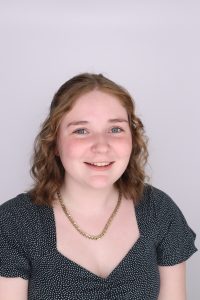The Jewish Community Center: Plants the Seeds for Growth and Connections
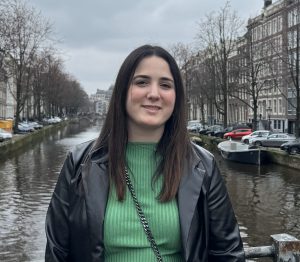 by Abbie Cadkin, ’25
by Abbie Cadkin, ’25
My internship at the Jewish Community Center in Indianapolis was a wonderful learning experience. This was my first internship, and it was without a doubt a positive experience. I learned useful skills in the communications field. I worked on my photography skills, created and repurposed graphics, conducted member interviews, and took great responsibility in the JCC’s social media presence. These projects provided me with valuable work experience by bringing me out of my comfort zone and teaching me how to overcome challenges.
I am Jewish and I consider that to be an important part of my identity. When I found out the JCC was offering an internship opportunity in the communications field, I felt like it was meant to be. It was comforting to work in an environment with people who share such a big part of my identity. I was grateful to learn new skills, while also immersing myself in my religion. I believe having an accepting work environment fosters learning and growth, and that is why I was successful at the JCC.
My experience at the JCC allowed me to apply the skills I learned in the classroom to the real world, which I had no prior experience with. I learned how to use Adobe InDesign and the Sprout social media site. These were both unfamiliar to me, and my supervisor Hanna helped me adapt to these new programs relatively quickly. I am incredibly grateful for the opportunity to work with Hanna. This internship was new territory for me, and Hanna always provided guidance when needed. Whenever I experienced any difficulties, I had her encouragement and support.
My favorite event I worked on was Earth Day at the J. I updated content, organized and executed a social media plan, and sent PR trade proposals. Helping plan this event taught me useful knowledge about the work world: not everything always goes according to plan. I had many obstacles thrown my way during this planning process, and I learned how to adapt to the last-minute changes being made. Despite these challenges, I had fun planning this event and it showcased my newly developed skills.
My time at the JCC was nothing short of amazing. I am grateful to have learned new skills, while forming meaningful connections with the Jewish community in Indianapolis. I cannot believe my time here has already come to a close. This is something that feels bittersweet. On one hand I developed skills I will be able to utilize in my future career, and on the other hand I had to say goodbye to a community that went above and beyond to make me feel welcome and supported.
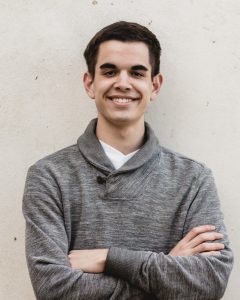 On February 6, 2025, I was lucky enough to attend Young Plato, the third event from the Compass Center’s A New View Film Series this school year, with my parents and partner. Following Dr. Deb Saxon’s opening remarks, Political Science Professor Dr. Siobhán McEvoy-Levy introduced the documentary. It tells the story of headmaster Kevin McArevey who teaches his students new ways of de-escalating tension at Holy Cross Primary School in Belfast, Northern Ireland. Dr. McEvoy-Levy has visited this school and attested to McArevey’s mission to enable children’s growth while tackling segregation and toxic masculinity.
On February 6, 2025, I was lucky enough to attend Young Plato, the third event from the Compass Center’s A New View Film Series this school year, with my parents and partner. Following Dr. Deb Saxon’s opening remarks, Political Science Professor Dr. Siobhán McEvoy-Levy introduced the documentary. It tells the story of headmaster Kevin McArevey who teaches his students new ways of de-escalating tension at Holy Cross Primary School in Belfast, Northern Ireland. Dr. McEvoy-Levy has visited this school and attested to McArevey’s mission to enable children’s growth while tackling segregation and toxic masculinity.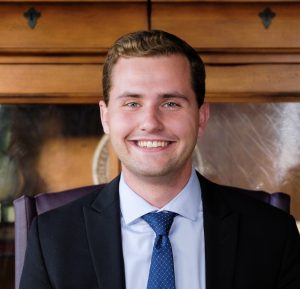 Of all job titles I have held, “Just Peace Intern at First Congregational Church” is undoubtedly the most unique and ambiguous. The name comes from First Congregational Church’s designation as a “Just Peace” church, which is one that congregations within the United Church of Christ denomination can attain.
Of all job titles I have held, “Just Peace Intern at First Congregational Church” is undoubtedly the most unique and ambiguous. The name comes from First Congregational Church’s designation as a “Just Peace” church, which is one that congregations within the United Church of Christ denomination can attain.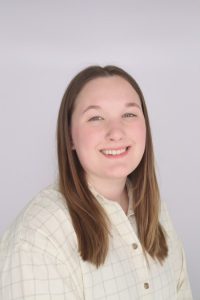 This semester, I had the wonderful opportunity to intern at the Jewish Community Center (JCC) in Indianapolis. Though it was my first internship experience, I can confidently say that I won’t soon forget the skills that I learned during my time at the JCC. I am so grateful for the period that I spend learning and growing, not only as a communications intern, but as a member of the greater Indianapolis community.
This semester, I had the wonderful opportunity to intern at the Jewish Community Center (JCC) in Indianapolis. Though it was my first internship experience, I can confidently say that I won’t soon forget the skills that I learned during my time at the JCC. I am so grateful for the period that I spend learning and growing, not only as a communications intern, but as a member of the greater Indianapolis community.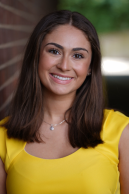 My time serving as the Interfaith Council has been one of the most rewarding experiences I’ve had in college. This year has been challenging, given everything that’s happened and is continuing to happen in the world. My goal was to foster an environment where people feel respected and safe. A place where people could ask questions without judgment and be vulnerable sharing their lived experiences. During my time interning at the Compass Center, I have felt encouraged to be creative and ask meaningful questions.
My time serving as the Interfaith Council has been one of the most rewarding experiences I’ve had in college. This year has been challenging, given everything that’s happened and is continuing to happen in the world. My goal was to foster an environment where people feel respected and safe. A place where people could ask questions without judgment and be vulnerable sharing their lived experiences. During my time interning at the Compass Center, I have felt encouraged to be creative and ask meaningful questions. As I wrap up my internship journey with the Center for Interfaith Cooperation (CIC), I’m filled with a profound sense of gratitude and reflection. This experience has been a transformative one, marked by meaningful encounters, insightful discussions, and invaluable lessons learned.
As I wrap up my internship journey with the Center for Interfaith Cooperation (CIC), I’m filled with a profound sense of gratitude and reflection. This experience has been a transformative one, marked by meaningful encounters, insightful discussions, and invaluable lessons learned.
